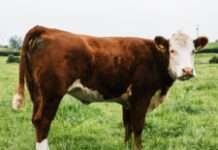New effort is collaboration between Dane G. Hansen Foundation and K-State Research and Extension.
MANHATTAN, Kan. – Northwest Kansas communities are gaining a new resource whose focus will be on training and supporting people as they work for the common good in those communities. And when good is happening, it can be catching.
To help spark that good, Nadine Sigle has been named the Dane G. Hansen Northwest Kansas community vitality specialist with K-State Research and Extension. Her role will be to increase leadership capacity among community volunteers and extension professionals with the aim of boosting vibrancy in those communities.
The new position is funded by a partnership between the Dane G. Hansen Foundation http://danehansenfoundation.org/ and K-State Research and Extension http://www.ksre.ksu.edu .
“This is a great opportunity for a public-private partnership to use private money for public good for the people who live and work in northwest Kansas,” said Trudy Rice.
Bringing people together was what Bill Riley had in mind when he suggested that representatives of the Hansen Foundation meet with Rice, the coordinator of the Kansas PRIDE program. Riley, former president of the Kansas 4-H Foundation, was familiar with the Hansen Foundation’s work to make northwest Kansas communities better places to live. After working through the details, the partnership launched, and Sigle was hired. She will begin her new role Jan. 1.
“We share a similar vision for Kansas as the Dane G. Hansen Foundation. This new community vitality position, funded by the foundation, will help both of our organizations’ work toward making the communities of northwest Kansas better places to live,” said John Floros, dean of Kansas State University’s College of Agriculture and director of K-State Research and Extension.
Sigle, who will be based in Osborne County, will assist community development specialists with building training programs, support materials and event planning – roles in which she has experience through her current position as a K-State Research and Extension family and consumer sciences agent with the Post Rock District and as a volunteer in Osborne County. She also has experience with the PRIDE program, which works with communities on projects designed to preserve, create or improve their future.
“It’s an exciting opportunity, and I look forward to the challenge,” Sigle said. “Northwest Kansas is and always has been home to me. I have a desire to see the quality of life for northwest Kansas residents maintained for our generation and future generations. It’s a good place to live and has a wide variety of interests and opportunities for people.”
Sigle said she’s always been bothered by the description of Kansas as a “fly-over state,” because she believes it has many hidden treasures: “While growing up, we were told to get an education and to go someplace bigger. That is something I disagreed with, as I could see the opportunities here along with the quality of life it offers.”
“We thought if we had our own representative that they would make faster progress,” said Carol Bales, a Hansen Foundation trustee. “It will be helpful to have someone who lives here and understands people’s interests.”
Bales, who lives in Logan, said that sometimes it’s a challenge to get people to support community projects: “They have to be enthused about the projects. That’s one of the things the PRIDE organization does, which helps make communities a place people want to come and live.”
She believes that when good ideas take hold in a community and others see the success, they will follow.
Different than economic development
Community development involves developing community capacity, Sigle said, which is different than economic development. As community capacity is developed, individuals start taking greater pride in their communities and work to make it a better place.
“Many of our communities and counties have economic development directors, but little is (formally) done for community development,” she said.
Small communities face many challenges such as loss of population, aging population, lack of health care services, water shortages, school closures, food deserts, and the need to transition leadership to younger adults, Sigle said.
“We need to be mindful of selecting topics in which we can have an impact and to remember our goal is to improve the quality of life of our citizens through education. In other words, we want to empower our residents with knowledge to be able to take on these challenges,” she said.
Sigle will work with the local K-State Research and Extension offices in the 26-county area, as well as economic development offices and PRIDE community contacts.
Involving students
“The goal is to work with 10 to 12 communities each year. I’ll continue to work with the (K-State Research and Extension) Board Leadership Series http://www.ksre.ksu.edu/boardleadership/p.aspx and use it as a tool to make contacts and encourage participation in the program,” she said. “I would also like to work with the high schools to have students develop a video to promote their home communities. By students developing videos, the intent is to open their eyes to the positives they have surrounding them. It will help them to develop pride in their communities.”




